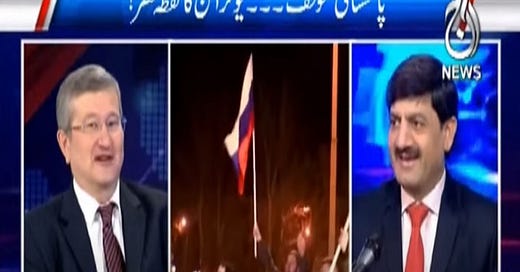Will Pakistan Condemn The Ukrainian Ambassador’s Criticism Of Its Principled Neutrality?
Pakistan’s objective national interests are served by publicly respecting itself and not letting foreign dignitaries openly meddle in their foreign policy and international perceptions thereof, let alone while being hosted by their government. The Ukrainian Ambassador crossed a diplomatic red line and should be made aware that his comments are what’s absolutely unacceptable, not Pakistan’s independent right to formulate its foreign policy however its decisionmakers feel is best.
Pakistan has impressively retained its official policy of principled neutrality towards the Ukrainian Conflict in spite of the US-orchestrated but domestically driven “lawfare” regime change that succeeded in ousting its multipolar Prime Minister in early April. This stance aligns with its objective national interests insofar as the South Asian state has successfully retained a pretense of strategic autonomy in the New Cold War. Despite relations with Russia having become unnecessarily complicated as a result of its post-modern coup authorities’ reluctance to enter into food and fuel deals with it and thus risk provoking their American patrons’ wrath, its representatives such as Ambassador Shafqat Ali Khan still formally hope to continue building mutually beneficial bilateral ties in the coming future.
Russia respects this pragmatic policy and its Foreign Minister even reportedly invited his Pakistani counterpart to visit Moscow at his earliest convenience in order to discuss further cooperation. This Eurasian Great Power sincerely aspires to maintain the momentum in their relations that characterized former Prime Minister Imran Khan’s nearly four years in office prior to his removal. While some might continue to have misgivings over what transpired in that country at the time and in the months since, Russia nevertheless continues to practice a strictly non-ideological foreign policy with all sincerely sovereign states that share its multipolar worldview of making International Relations more equal, fair, and just. To that end, it’ll never pressure its partners – even wayward ones – into zero-sum choices.
Ukraine, by contrast, just sharply criticized Pakistan’s principled neutrality after its Ambassador to that country condemned it in a recent interview as “unacceptable” and “like provoking Russia against Ukraine.” Moscow doesn’t consider Kiev to be functionally independent after its representatives accused their counterparts in that former Soviet Republic of willingly doing their American patrons’ bidding over the past eight years since the spree of urban terrorism popularly known as “EuroMaidan” succeeded in pulling off a Neo-Nazi coup there. It therefore follows that the Ukrainian Ambassador to Pakistan’s undiplomatic condemnation of his hosts is a proxy for expressing his US overlords’ displeasure with Islamabad’s principled neutrality towards that conflict.
Regardless of whether one shares this interpretation, it’s extremely disrespectful for that diplomat to condemn Pakistan’s foreign policy, which is arguably akin to meddling in its formulation by spreading false claims about its impact with respect to supposedly “provoking Russia against Ukraine.” Those members of the multipolar school of thought within Pakistan’s military, intelligence, and diplomatic bureaucracies (“deep state”) should promptly do their utmost to convince their pro-American peers who are presently running the show behind the scenes for the most part to put aside their ideological affinity for the US and resolutely defend their objective national interests by officially condemning the Ukrainian Ambassador’s undiplomatic intervention into their foreign policy formulation.
For everything that the post-modern coup authorities can rightly be criticized for by their own people and interested observers, their continued commitment to at the very least superficially preserving their predecessor’s principled neutrality towards the Ukrainian Conflict isn’t one of them. Even though it lacks the substance of its Indian and Iranian neighbors with respect to their reluctance to expand relations with Russia owing to fear of the US’ response, it’s still arguably better than formally jumping on the American bandwagon by publicly condemning and subsequently sanctioning that Eurasian Great Power. Remaining silent in the face of the Ukrainian Ambassador’s undiplomatic attacks against them and his false portrayal of the impact of their foreign policy would undeniably be seen as political weakness.
Pakistan’s objective national interests are served by publicly respecting itself and not letting foreign dignitaries openly meddle in their foreign policy and international perceptions thereof, let alone while being hosted by their government. The Ukrainian Ambassador crossed a diplomatic red line and should be made aware that his comments are what’s absolutely unacceptable, not Pakistan’s independent right to formulate its foreign policy however its decisionmakers feel is best. Kiev’s American patrons already captured control of a significant share of the Pakistan state as a result of the post-modern coup that they orchestrated last spring but they’ve yet to ruin its relations with Russia by getting their domestic proxies to abandon former Prime Minister Khan’s policy of principled neutrality.
It'll be telling to observe how Islamabad reacts – if at all – across the coming week to this major diplomatic offense that was just committed against them by the Ukrainian Ambassador. Acknowledging their sensitivity towards offending America (which importantly isn’t the same as endorsing it), it might therefore be best for a so-called “source” to leak to local media that their officials discretely conveyed their displeasure with that representative if they aren’t confident enough to publicly condemn him. Not doing anything would suggest that Pakistan’s strategic sovereignty continues to erode in the aftermath of the US-orchestrated post-modern coup and has gotten so bad in recent days that this once-proud state no longer has the self-respect to respond to those who openly meddle in its affairs.




